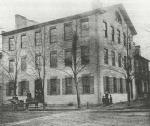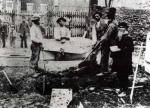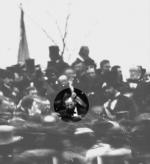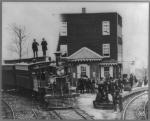Chapter Four: Gettysburg Address
The night before the dedication of the national cemetery at Gettysburg, featured speaker Edward Everett had difficulty sleeping. He was not especially nervous about his two-hour address. After all, the former U.S. senator and Harvard president was one of the nation's most distinguished orators. Nor was his restlessness the result of old age, even though he was nearly seventy.
The problem was Pennsylvania governor Andrew Curtin. The two men were supposed to share a bed in the overcrowded Wills House where they were staying. The governor, a former businessman, thought he could do better, and sought out more privacy somewhere else.
Wills House where they were staying. The governor, a former businessman, thought he could do better, and sought out more privacy somewhere else.
Everett was convinced that his roommate would return sooner or later. He confided to his diary that, "the fear of having the Executive of Pennsylvania tumbled in upon me kept me awake until one."
In 1863, Gettysburg was a community of about 2,500 residents. The dedication ceremonies on November 19 drew an estimated 15,000 visitors. Local attorney and event organizer, David Wills, felt that only President Lincoln deserved to get his own room, so Everett tossed and turned. The landscape designer of the cemetery dozed on a chair downstairs.
Nobody knows exactly how Abraham Lincoln slept that night, but the legend that he was frantically drafting his remarks from the back of an envelope is almost certainly not true. Although the president did ask his host that evening for some writing paper, if anything, he was only recopying his carefully prepared text.
carefully prepared text.
The president had been struggling all year to define the war's purpose for an increasingly exhausted northern public. He tried in a series of speeches and public letters to explain his more controversial political decisions like the first-time national draft or emancipation for southern slaves. He also looked for ways to justify the incredible carnage of the war, which was already much longer and far bloodier than anyone had expected.
"How long ago is it? - eighty odd years," he asked awkwardly in July, trying to raise public spirits, "since on the Fourth of July for the first time in the history of the world a nation by its representatives, assembled and declared as a self-evident truth that 'all men are created equal.'"
Four months later, this sentiment became in his Gettysburg Address the most famous opening line in American history: "Four score and seven years ago our fathers brought forth upon this continent, a new nation, conceived in Liberty, and dedicated to the proposition that all men are created equal."
Gettysburg Address the most famous opening line in American history: "Four score and seven years ago our fathers brought forth upon this continent, a new nation, conceived in Liberty, and dedicated to the proposition that all men are created equal."
The words have become noble and inspiring today, but at the time the president faced real skepticism. Many members of his own political party thought he had been weak and slow to push for the end of slavery. Thaddeus Stevens, the powerful congressman from Lancaster, had been one of Lincoln's toughest critics. When he heard that the president planned to attend the ceremonies at Gettysburg, he reportedly exclaimed, "Let the dead bury the dead."
Thaddeus Stevens, the powerful congressman from Lancaster, had been one of Lincoln's toughest critics. When he heard that the president planned to attend the ceremonies at Gettysburg, he reportedly exclaimed, "Let the dead bury the dead."
Others questioned the president for moving too fast. Many northerners were willing to fight a war for the Union, but not for black freedom. They wanted to let slavery alone and resented Lincoln's decision to use "the Emancipation lever," as he called it, to punish the Confederate states for seceding.
The president did not raise any of these issues directly in his brief remarks at Gettysburg, but he spoke about liberty and equality with such passion that few could mistake his intention.
The reaction to Lincoln's great address was predictably divided. His friends admired the "firm free way" of the speech, as aide John Hay described it. His critics blasted the effort. The Democratic newspaper in Harrisburg belittled his speech as "silly remarks" and claimed the much-abused national executive was "more like a well-trained monkey than a man of sense and a gentleman."
On his return to Washington, Lincoln was delayed for several hours at Hanover Junction in York County. Observers noted that he appeared tired and pale. It turned out that he had contracted a mild version of smallpox only a few days before. Joking about the many demands placed upon him, Lincoln reportedly said, "Now, I have something I can give everybody."
Hanover Junction in York County. Observers noted that he appeared tired and pale. It turned out that he had contracted a mild version of smallpox only a few days before. Joking about the many demands placed upon him, Lincoln reportedly said, "Now, I have something I can give everybody."
But there was at least one figure who immediately understood the greatness in Lincoln's words. The day after the Gettysburg event, Edward Everett sent the president a letter of congratulations. "I should be glad," he wrote, "if I could flatter myself that I came as near to the central idea of the occasion, in two hours, as you did in two minutes."
The problem was Pennsylvania governor Andrew Curtin. The two men were supposed to share a bed in the overcrowded
Everett was convinced that his roommate would return sooner or later. He confided to his diary that, "the fear of having the Executive of Pennsylvania tumbled in upon me kept me awake until one."
In 1863, Gettysburg was a community of about 2,500 residents. The dedication ceremonies on November 19 drew an estimated 15,000 visitors. Local attorney and event organizer, David Wills, felt that only President Lincoln deserved to get his own room, so Everett tossed and turned. The landscape designer of the cemetery dozed on a chair downstairs.
Nobody knows exactly how Abraham Lincoln slept that night, but the legend that he was frantically drafting his remarks from the back of an envelope is almost certainly not true. Although the president did ask his host that evening for some writing paper, if anything, he was only recopying his
The president had been struggling all year to define the war's purpose for an increasingly exhausted northern public. He tried in a series of speeches and public letters to explain his more controversial political decisions like the first-time national draft or emancipation for southern slaves. He also looked for ways to justify the incredible carnage of the war, which was already much longer and far bloodier than anyone had expected.
"How long ago is it? - eighty odd years," he asked awkwardly in July, trying to raise public spirits, "since on the Fourth of July for the first time in the history of the world a nation by its representatives, assembled and declared as a self-evident truth that 'all men are created equal.'"
Four months later, this sentiment became in his
The words have become noble and inspiring today, but at the time the president faced real skepticism. Many members of his own political party thought he had been weak and slow to push for the end of slavery.
Others questioned the president for moving too fast. Many northerners were willing to fight a war for the Union, but not for black freedom. They wanted to let slavery alone and resented Lincoln's decision to use "the Emancipation lever," as he called it, to punish the Confederate states for seceding.
The president did not raise any of these issues directly in his brief remarks at Gettysburg, but he spoke about liberty and equality with such passion that few could mistake his intention.
The reaction to Lincoln's great address was predictably divided. His friends admired the "firm free way" of the speech, as aide John Hay described it. His critics blasted the effort. The Democratic newspaper in Harrisburg belittled his speech as "silly remarks" and claimed the much-abused national executive was "more like a well-trained monkey than a man of sense and a gentleman."
On his return to Washington, Lincoln was delayed for several hours at
But there was at least one figure who immediately understood the greatness in Lincoln's words. The day after the Gettysburg event, Edward Everett sent the president a letter of congratulations. "I should be glad," he wrote, "if I could flatter myself that I came as near to the central idea of the occasion, in two hours, as you did in two minutes."












